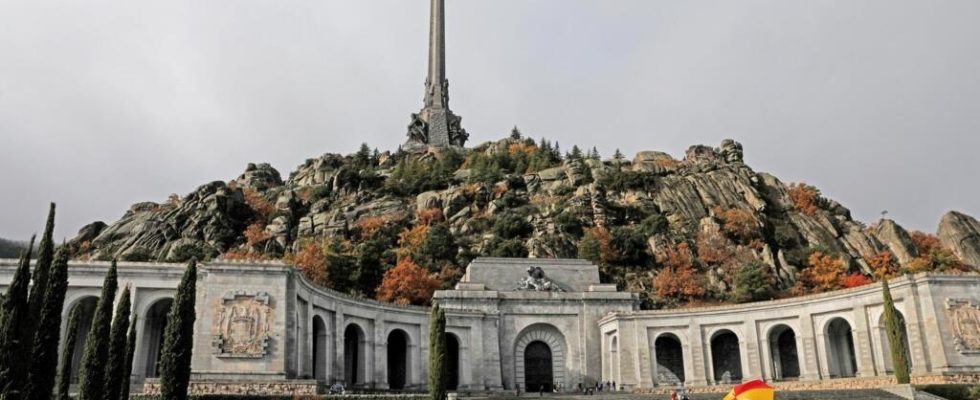The remains of José Antonio Primo de Rivera, founder of the Falange, a fascist-inspired party which was one of the pillars of Francoism, is exhumed this Monday from the former mausoleum of Franco. This exhumation representsone step closer», in the work of memory on the Civil war and the dictatorship, according to the government of left.
Three and a half years later the exhumation of the remains of dictator Franco, the mortal remains of José Antonio Primo de Rivera (1903-1936), founder of the fascist Falange party, should be discreetly transferred to the Madrid cemetery of San Isidro. ” It’s one more step in what we are doing » from this place, « where it should not be possible to pay tribute to a person evoking the dictatorship “, insisted Thursday the Minister of the Presidency, Felix Bolaños, after the announcement of this exhumation by the government.
” Spanish democracy does not deserve this kind of place, he added on Friday. This exhumation, three and a half years after that of Franco’s remains, stems from the entry into force last October of a flagship law of the left-wing government called ” Democratic memory ».
Transforming this unparalleled monument in Europe
Coming to power in 2018, Socialist Prime Minister Pedro Sánchez made the rehabilitation of victims of the Franco dictatorship (1939-1975) a priority. After months of legal battle with Franco’s familyhe managed in 2019 to exhume the remains of the “ Caudillo ” of “ Valle de los Caidos ” (literally, “ the valley of the fallen “), so that this mausoleum, without equivalent in other Western European countries having known dictatorships, can no longer be a “ place of apology of Francoism.
Franco and Primo de Rivera had been buried there on either side of the altar of the basilica. Ordered by Franco in 1940 to celebrate his ” glorious crusade “Catholic versus Republicans” without god », the construction of the « Valle de los Caidos », renamed by the government « Valley of Cuelgamuros by thousands of political prisoners lasted almost twenty years.
Overhung by a cross 150 meters high, this basilica is visible for dozens of kilometers around. Invoking the “ national reconciliation Franco had had the bodies of more than 30,000 victims of the Civil War transferred there, Francoists, but also Republicans, taken from cemeteries and mass graves without their families being informed.
The memory of the Civil War divides on the right
The remains of Republican victims claimed by their families must also be exhumed, but the procedure has been delayed due to a legal battle. The question of the memory of the Civil War and the dictatorship still divides Spain, where the wounds of the past have not healed. The right accuses the left of reopening them and has promised to repeal the law if it returns to power in the year-end elections. The government “still wants to desecrate graves, dig up hatred”, launched last Thursdaythe leader of the far-right Vox party, Santiago Abascal, to the cheers of his supporters.
(With AFP)
► To read also: Spain: 40 years later, Francoism still weighs
The Spanish Falange, a fascist organization
Founded on October 29, 1933 by José Antonio Primo de Rivera, son of Miguel Primo de Rivera, Spanish dictator from 1923 to 1930, the Spanish Falange is an ultra-nationalist political organization. This doctrine places the interests of the state and the nation above individual and group interests and advocates the unity of Spain. This political ideology is directly inspired by the model of Italian fascism. This far-right party played an important role in the Spanish Civil War and recruited its first members from the middle classes and among students. Falange militants distinguished themselves in particular in street battles against leftist and extreme leftist revolutionary militants. After the Civil War, Falangism became the only legal party allowed in Spain. During the Franco dictatorship, the Falange was one of the pillars of the Franco regime along with the Catholic Church and the army. This authoritarian and conservative ideology will rule Spain until its dissolution in 1977. While it is difficult to establish with certainty the exact number of deaths caused by Franco’s repression in Spain, historians estimate the number of victims at 150,000. . The various movements claiming to belong to the Falange still exist today, although they do not have any significant electoral weight.
Julien Hennequin
